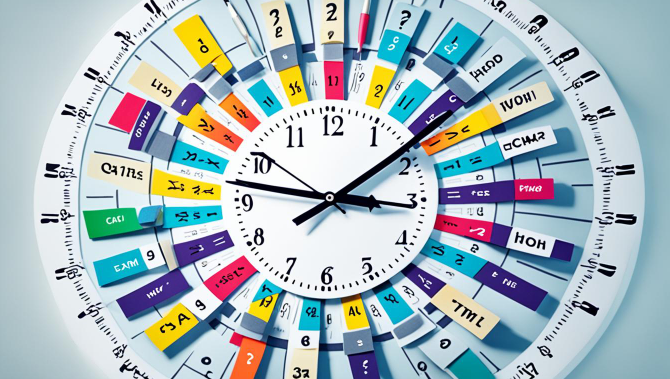Time management is key to doing well in exams, yet nearly 88% of students find it hard. They struggle to balance study, fun, and self-care, often leaving things until the last minute. This guide offers useful advice on preparing for exams and managing study time to boost your confidence and skills, while also reducing exam stress.
Choosing the right tools can greatly help. You might like planners from Moleskine or Plum Paper, or perhaps digital ones such as Google Calendar. Organizing your schedule is important. Tools like Asana, Trello, and Structured can aid in daily planning. Bullet journals and apps like Notion and Evernote keep things tidy and in one spot.
Working with others, like study buddies, can keep you focused and organized. It’s important to prioritize tasks and take care of yourself too. Don’t forget to add buffer time to your schedule to tackle unexpected issues, and be ready to adjust as needed.
Following these tips can lessen test stress and boost your performance. Planning your time well and taking breaks are key. It’s also crucial to spend the last few minutes on answer review, skim through the exam at the start, and practice with full exams in a realistic setting. Using timed practice tests can further improve your time management skills and reduce anxiety.
Create a Comprehensive Calendar
Implementing effective time management strategies, such as creating a comprehensive calendar, is key to managing your time well during exams. It allows you to see your study schedule clearly. You can choose between a digital calendar, like Google Calendar, or a physical one, such as a Moleskine book.
Choosing Between Digital and Physical Calendars
It’s important to pick the right type of calendar for you. Digital versions are easy to access and adjust. They let you plan with friends and remind you about your study times. But, physical calendars can help some students see and track their work better.
Integrating Calendars with Other Tools
Linking your calendar with other apps can make studying easier. Adding your study times, important projects, and test dates to one place helps. It keeps you on track with your study goals. Alerts can also remind you of big academic dates, helping balance your workload.
Prepare a Study Schedule
Making a good study schedule is key for balance and wellbeing during exams. A plan that includes time for different subjects, work, friends, and fun can make you more productive. It also helps lower stress.
Allocating Time for Different Subjects
It’s important to give each subject enough study time. Don’t try to study for 16 hours straight. Focus on quality study time. Cornell’s experts suggest reviewing for an hour after class for better memory. Using the Pomodoro Technique helps too. It involves 25-minute study sessions with 5-minute breaks in between.
This method helps keep your focus sharp. Regularly looking over your coursework each week helps too. It keeps you up-to-date and makes your study time balanced.
Incorporating Breaks and Recreation
Breaks and fun are as crucial as study time. Studying a bit each day, like an hour, works better than last-minute cramming. A five-day plan, where you spend 2 hours daily on study and review, is good. It helps keep things fresh and easy to manage.
Adding relaxation and social time during low-energy times is smart. It helps keep you happy and does wonders for your grades. By mixing study with breaks and fun, students can do well in school. They stay mentally well and keep a study routine that lasts.
Strategize Your Exam Approach
An effective exam strategy is key for the best performance and good time management. Getting to know the exam layout and using specific techniques can greatly improve your test-taking skills and success in the actual exam.
Familiarize Yourself with the Exam Format
It’s important to know the exam format for managing time well during tests.Understanding how the exam is structured, including multiple-choice questions, short answer responses, essays, and practical problems, helps in planning. You can then smartly answer different parts and feel more confident.
Effective Techniques for Solving Mock Tests
Practicing with mock exams is a great way to get better at taking tests. By creating exam-like conditions, students can improve their strategies and learn how to manage their time. Regular mock exams show where you need to focus more.
Taking short breaks often when studying keeps your mind sharp. The Pomodoro technique, where you study in short sessions with breaks in between, is very helpful. It keeps you productive and focused.
Using these methods makes you more familiar with the exam material and better at managing time. This can lead to achieving higher scores. Check out more tips on managing time during exams for even more help.
Practice Regularly
Regular practice under exam conditions is key to better time management. Students improve by doing writing practice, attempting past papers, and mock exams often. This helps them handle pressure well.
Having timed sessions in practice develops quick writing and clear thinking. These skills are very important for the exam day.
Writing Practice Under Exam-Like Conditions
A time audit shows students how to use their time well when practicing. It’s good to have clear study goals. Using the SMART framework helps with this.
Adding regular mock exams and practicing with a past paper is smart. It helps students feel more confident and do better.
Time-Limited Practice Sessions
The Pomodoro method uses 25-minute work periods to increase focus. It also includes short breaks. This technique boosts productivity.
Creating a detailed calendar and weekly plan helps include these sessions in study times. Taking breaks every 30-60 minutes helps avoid burnout and keeps focus sharp.
Read the Full Question Paper First
Reading the entire paper at the start is smart. It helps manage your valuable time well during the test. By doing this, you figure out which questions are most important.
You learn how to use your time wisely. And you decide which questions you should do first.
Using the Reading Time Effectively
Students get about 2 to 3 minutes to look at the paper during exams. Good exam-reading strategies help you spot easy questions. This stops you from panicking if you misread something.
Note the points for each question and how hard they are. Then, plan your answers.
Identifying Key Questions Quickly
Looking at the exam before starting helps you focus on questions that give more marks. This step helps in picking the best questions to answer first. It’s important to know how long to spend on each question.
Not spending too much time on questions with few marks is key. Organizing your time well means doing better on the test.
Prioritize Questions Strategically
Learning how to prioritize questions is very important. It can make exams easier and help you do better. When students spend too much time on initial questions, it can adversely affect their performance and stress levels. When you know which questions you can answer easily, start with those. This gets you points fast and keeps you feeling good as you work.
Marking Confident Answers First
Start with the questions you know well. This will help you get easy points quickly. It will also make you feel more sure of yourself. Studies show that this method leads to better scores and smarter time use.
Allocating Time Based on Question Complexity
Spend more time on hard questions or those worth more points. Give less time to the easy ones. Studies say this method can help you get higher scores. By focusing on the difficulty of each question, you can do your best on the exam.
Allocate Time for Each Question
Developing strong time management skills is crucial for creating a detailed time plan for exams. This helps students give each question a specific time slot. They can also save time for review. This way, students avoid spending too much time on one question. It lowers the risk of incomplete answers. This helps students score better.
Creating a Time Division Plan
Creating a good time plan means dividing your exam time well. For the NBCOT® Exam, you get 4 hours. You have to do 3 Clinical Simulation Test (CST) items and 170 Multiple Choice questions. Plan to spend about 10-12 minutes on each CST. This totals 30-35 minutes. Then, spend about one minute on each multiple-choice question. This helps cover everything well.
In professional exams, managing time is tough, especially on the first question. You should follow a timeline to cover everything. For example, spend 30 minutes on a 12-mark task. Then, 20 minutes on an 8-mark task. This helps you do better by not sticking too long on one question.
Sticking Rigorously to Your Time Plan
Sticking to your time plan is crucial. Once you have your strategy, follow the times you set for each question. To keep pace, try finishing the first 70 multiple-choice questions in 70 minutes. Then, take a 10-15 minute break. This break helps you get ready for the next part. Here, spend 100 minutes on the next 100 questions and 20-25 minutes for review.
Staying calm and focused is also important. Nervousness is common, but being prepared helps you stay calm. This helps you stick to your time plan better. By practicing these strategies, you can do better on exams and leave fewer questions unanswered.
Start with Easier Questions
Starting an exam with easy questions can really help. It makes you feel calm and ready for harder ones later. Studies show people with the same knowledge do differently depending on their test tactics. Choosing easy questions first helps you gain momentum and create a good rhythm early on.
Building Confidence Early
By starting with easy questions, students set themselves up for success. This boosts confidence. Getting these questions right away scores early points and lowers stress. It also helps you feel more in control. Missing easy questions early can hurt scores a lot. So, it’s important to get them right.
Saving Tough Questions for Last
It’s smart to save hard questions for the end. This way, students can focus on their strongest areas first. This strategy helps avoid simple mistakes made when rushed. Leaving difficult questions for later helps with problem-solving and time management.
Using these methods, like starting with simpler questions, ups your confidence. It also might help you score higher through a smart and calm strategy.
Request Additional Answer Sheets in Advance
Being ready for exams means thinking ahead, like asking for more answer sheets early. This helps you stay focused during the test without worrying about running out of paper. It makes sure the exam goes smoothly without any stops.
Getting ready for exams also means planning your study time well. If you’re in class for an hour, you should study 2-3 hours more on your own. This could mean up to 45 hours of study every week outside class. By managing your time well, studying becomes easier, with 3-6 hours each day.
Using smart study methods can also boost your exam readiness. The Pomodoro Technique® is one good way. It has you work for 25 minutes, then take a short break. It helps you use your study time better.
And, don’t forget to plan how much time to spend on each subject. You might spend 4 hours on English and 8 on Biology, for example. This kind of plan makes sure you’re ready and don’t run out of answer sheets.
Asking for more answer sheets ahead of time is a smart move. It means you won’t have to stop during your exam to ask for more paper. This keeps your test going smoothly, helping you do your best.
Revise Your Answer Sheet Before Submission
Before you turn in, check your answer sheet one last time. This makes sure you didn’t miss anything. It helps improve spelling and grammar, too. So, your answers will be clear and precise.
Checking for Missed Questions
Sometimes, you might skip questions without noticing. A final check helps find and fix these mistakes. So, every question gets an answer, and you don’t lose points.
Correcting Spelling and Grammar Mistakes
Reviewing your work can fix errors in your writing. It makes your answers look and sound better. Also, good spelling and grammar help you get a better grade.
Conclusion
Mastering exams needs good time management. This includes planning well and following through. Creating a detailed calendar can help a lot.
Setting up study schedules that fit your needs is key. Techniques like the Pomodoro Technique boost productivity. They help you study smarter.
Managing time well lowers stress and builds confidence. Focusing on one task makes you way more productive. It’s better than trying to do many things at once.
Taking regular breaks, like every 90 minutes, is also important. Sleep expert Nathaniel Kleitman says it keeps you productive and healthy.
Breaking big tasks into smaller pieces helps a lot. It makes things easier to manage. Using planners and apps helps keep track of everything.
This approach makes sure you spend the right amount of time on each task. It leads to better grades and a happier life. Using these tips can help students do well on exams and reach their goals.
FAQ
Why is creating a comprehensive calendar important for exam preparation?
A comprehensive calendar keeps you on track. It brings together deadlines, study times, and other commitments. You’ll see what’s ahead, avoiding stress and last-minute work.
How do I choose between a digital calendar and a physical planner?
Digital calendars and physical planners both have their perks. Your choice should reflect your personal style and how you organize your day. Think about what’s easier for you and fits your routine better.
What should I include in my study schedule?
Your study schedule should balance study, work, hobbies, and rest. Make sure to plan for breaks too. This helps keep your mind fresh and prevents burnout.
How can familiarizing myself with the exam format help in time management?
Knowing the exam layout lets you plan better. You’ll understand what to focus on and how to practice. This strategy saves you time on the exam day.
Why is practicing under exam-like conditions beneficial?
Practicing like it’s the real exam helps you work well under pressure. It boosts your speed and clear thinking. You’ll feel more confident and manage your time better.
How can reading the entire question paper first improve my exam performance?
Looking at the whole question paper first helps you plan your time. It helps you spot easier questions and strategize your answers. This reduces stress and makes sure you don’t miss anything important.
What is the benefit of starting with easier questions during an exam?
Beginning with the easy questions helps build confidence quickly. It gives you a strong start. This strategy creates a time buffer for tougher questions later on.
Why is it important to request additional answer sheets in advance?
Asking for more answer sheets early keeps you from being interrupted. You can keep writing smoothly. This helps you stay focused on your exam without any hold-ups.
How should I utilize the final moments of the exam for revision?
During the last few minutes, check your answers for mistakes. Look for missed questions or errors in spelling and grammar. This can improve your answers and possibly your score.

More Posts
35 Time Management Tips for Entrepreneurs
If you manage a team or run a business, you’re most probably racing against the clock. As time marches on without a pause, you watch yourself chasing after it. Huffing and puffing, red...
9 Time Management Tips from Elon Musk
Time management is different for everyone. It depends on your job, your personality, and what you like. Trying out new methods can help you find balance and be more productive. In this piece,...
30 Games & Activities to Enhance Time Management
When you hear the term ‘time management’, your heart races. Sweat beads on your forehead. You feel a crushing sense of urgency. Time’s running away, and you’re chasing after it! We’re here to...
OKR Case Studies: 5 businesses who successfully Use OKRs
Before switching to OKR’s, every company has some sort of fear regarding the impact of this framework to their business. The best way to help them overcome this fear is by letting them...




